Merchant of Venice Workbook Answers Act 3, Scene 1 – ICSE Class 10 & 9 English
ICSE SolutionsSelina ICSE SolutionsML Aggarwal Solutions
EnglishMathsPhysicsChemistryBiology
Passage – 1 (Act III, Sc.I, 32-42)
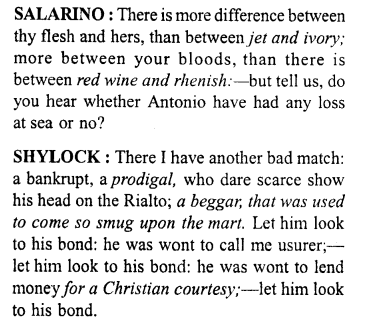
Paraphrase :
SALARINO : There is more difference between your flesh and hers than between coal and ivory;, more between your bloods than there is between red wine and white Rhine wine. But tell us, do you hear whether Antonio has had any losses at sea or not?
SHYLOCK : There I have another bad match: a bankrupt, a prodigal, who scarcely dares to show his face in the Market place; a beggar, that used to come on the market so smugly; let him look to his promise to pay: he was in the habit of calling me a usurer; let him look to his promise to pay: he was in the habit of lending money for Christian courtesy; let him look to his promise to pay.
Word Meaning With Annotation
Jet and ivory : jet is deep black, while ivory is extremely white, red wine and Rheenish : there would be great difference in appearance between the two blends of wine; for Rhenish, or wine from the Rhine valley, is white, bad match ; a bad stroke of business, prodigal : a wasteful person, a beggar, that was used to come so smug upon the mart : he is now reduced to beggary, who used to come into the market place with such a smiling and self-satisfied expression, for a Christian courtesy : Shylock speaks the words in bitter scorn. He cannot conceive of a man lending money from any other motive than to extort as much interest as possible. Antonio’s generous spirit moves the Jew to fury.
Read the above passage and answer the following questions
Question 1.
Where are Salarino and Shylock? Is there anyone else there?
Answer:
The scene is set in Venice. Salanio, Salarino and Shylock are engaged in conversation.
Question 2.
Who used this phrase ‘flesh and blood’? Was it misunderstood by anyone?
Answer:
Shylock used this phrase to describe his daughter, Jessica. He was sorry to say that his own flesh and blood rebelled. He was thus referring to Jessica’s elopement. It is unbearable for Shylock that his own daughter should run away with a Christian and show her disregard for her father.
This remark was misunderstood or deliberately misinterpreted. Shylock uses the phrase flesh and blood in the usual sense, that Jessica is his natural daughter. He refers to the biological relationship between father and child. But Salanio/Salarino make fun of him, asking him if his physical desires are roused even in hid old age.
Question 3.
Explain the comparisons made by Salarino between
(a) Jet and ivory,
(b) Red wine and rhenish
Answer:
Salarino is quick to point out that there is hardly any similarity between Shylock and his daughter Jessica.
(a) If Jessica is ivory which is white and beautiful, Shylock is jet black and unattractive.
(b) Jessica is rehnish (white wine) while Shylock is red wine. There can be no confusion between the two.
Question 4.
In what sense is Antonio a prodigal? Is he a bankrupt? Explain Shylock’s views. Give your comments.
Answer:
When Salarino talks about Antonio’s losses, Shylock speaks impatiently. He had given a loan of three thousand ducats against this man’s security. Shylock calls Antonio a bankrupt who has no money to spend. All he had has been lost.
The Shylock charges Antonio for being a prodigal. He has wasted his money thoughtlessly. According to Shylock, Antonio has ruined himself by taking a loan for his extravagant friend. This is a culpable prodigality. We may not, however, agree with Shylock in blaming a self- sacrificing gentleman like Antonio.
Question 5.
Why is Antonio not seen at the Rialto?
Answer:
Now that Antonio is a bankrupt, with many debts and loans yet to be cleared, he does not come to Rialto, the stock exchange. This remark of Shylock shows that of late Antonio had stopped visiting Rialto where merchants generally gather to do business.
Question 6.
Shylock gives the warning, “let him look to his bond”. What are his reasons?
Answer:
Shylock gives the warning to be conveyed to Antonio to take care of his bond. He must repay the money within the prescribed limit of time. Shylock complains that Antonio used to call him a despicable money-lender charging high interest. He also used to lend money to people without interest to show his Christian generosity.
Passage – 2 (Act III, Sc.I, Lines 45-63)
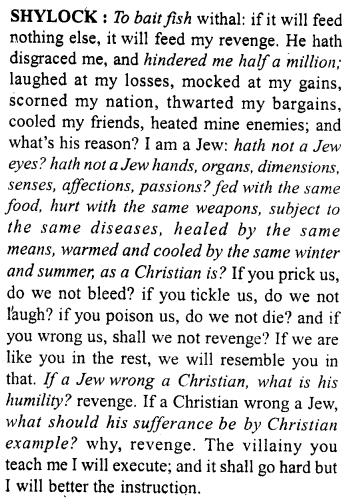
Paraphrase :
SHYLOCK : To bait fish with: if it feeds nothing else, it will feed my revenge. He has disgraced me and insulted me half a million times; laughed at my losses, joked about my gains, insulted my religion, crossed my deals, cooled my friends, heated my enemies. And what’s his reason? I am a Jew. Doesn’t a Jew have eyes? Doesn’t a Jew have hands, organs, dimensions, senses, affections, passions, fed with the same food; hurt with the same weapons, subject to the same diseases, healed by the same means, warmed and cooled by the same winter and summer, as a Christian is? If you stick us, don’t we bleed? If you tickle us, don’t we laugh? If you poison us, don’t we die? And if you wrong us, shouldn’t we seek revenge? If we are like you in the rest, we’ll resemble you in that. If a Jew wrongs a Christian, what is his option? Revenge. If a Christian wrongs a Jew, what should his choice be by Christian example? Why, revenge. The villainy you teach me I’ll use; and it shall be hard but I’ll make the lesson better.
Word Meaning With Annotation
to bait fish : means “to feed fish.” hindered me half a million : “caused me to lose half a million ducats, “ by lending money to people who might otherwise have borrowed from Shylock. hath not a Jew eyes? hath not a Jew hands, organs, dimensions, senses, affections, passions? fed with the same food, hurt with the same weapons, subject to the same diseases, healed by the same means, warmed and cooled by the same winter and summer, as a Christian is : Shylock is comparing the physical bodies and powers of the Jew and the Christian, and proving that they are exactly similar. Then he passes to “senses, affections,” and finds that here also there is no difference. If a Jew wrong a Christian, what is his humility : Shylock sneers at the Christian religion. The teaching of Christ is that a Christian must never take revenge, but must forgive his enemy in a spirit of proper humility. But Shylock says that this is not observed. He asks “If a Jew wrongs a Christian, does the latter show humility? No! He takes revenge.” The sense of “humility” here is “patience” or “humanity.” what should his sufferance be by Christian example : what should his attitude be if he is guided by the example which Christians set him?
Read the above passage and answer the following questions
Question 1.
What substance is meant to bait fish?
Answer:
Flesh is meant to bait fish.
Question 2.
Who is responsible for harming Shylock?
Answer:
Antonio is the man who is responsible for this.
Question 3.
Point out in what all ways the Christians and Jews are alike?
Answer:
Christians and Jews are alike in whishes, desires, feelings and emotions. The Jews have hands, organs, limbs and senses like the Christians. They eat the same type of food : they are wounded with the same weapons laible to suffer from the same diseases and cured By the same medicines. They feel heat and cold like to Christians.
Question 4.
How does’ a Christian behave when he is insulted by a Jew?
Answer:
A Christian takes revenge.
Question 5.
How will Shylock match the villainy of the Christians.
Answer:
He will also practise villainy. He would try his best to improve upon the lesson he has been taught by the Christians. Shylock believes in a policy of tit-for-tat.
Passage – 3 (Act. III, Sc.I, Lines 43-63)
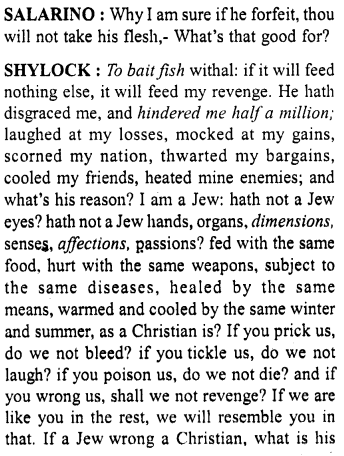
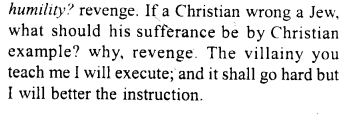
Paraphrase :
SALARINO : Wiry, I am sure, if he defaults, you won’t take his flesh; what’s that good for?
SHYLOCK : To bait fish with: if it feeds nothing else, it will feed my revenge. He has disgraced me and insulted me half a million times; laughed at my losses, joked about my gains, insulted my religion, crossed my deals, cooled my friends, heated my enemies. And what’s his reason? I am a Jew. Doesn’t a Jew have eyes? Doesn’t a Jew have hands, organs, dimensions, senses, affections, passions, fed with the same food, hurt with the same weapons, subject to the same diseases, healed by the same means, warmed and cooled by the same winter and summer, as a Christian is? If you stick us, don’t we bleed? If you tickle us, don’t we laugh? If you poison us, don’t we die? And if you wrong us, shouldn’t we seek revenge? If we are like you in the rest, we’ll resemble you in that. If a Jew wrongs a Christian, what is his option? Revenge. If a Christian wrongs a Jew, what should his choice be by Christian example? Why, revenge. The villainy you teach me I’ll use; and it shall be hard but I’ll make the lesson better.
Word Meaning With Annotation
To bait fish : means “to feed fish.” hindered me half a million : “caused me to lose half a million ducats, “ by lending money to people who might otherwise have borrowed from Shylock. dimensions : limbs, affections : likes, humility : patient submission or forbearance.
Read the above passage and answer the following questions
Question 1.
About whom are SALARINO and Shylock talking?
Answer:
SALARINO and Shylock are talking about Antonio.
Question 2.
Is Shylock justified in his complaint?
Answer:
Shylock certainly seems to be justified in his complaint against Antonio. Judging the case by Shylock’s version of the facts, Antonio has always been most unjust to him. According to Shylock’s account, Antonio has been insulting and humiliating Shylock, and also been ridiculing and mocking at him. Antonio has, furthermore, been hindering Shylock’s transactions and been instigating Shylock’s enemies against him.
Question 3.
Explain the last sentence in Shylock’s speech.
Answer:
Shylock says that the Christians have been treating the Jews in a most wicked and cruel manner, and that now he too would follow the example of the Christians and would treat the Christian Antonio in the same cruel manner. Nay, Shylock would treat the Christian Antonio in a more cruel manner than the Christians have been treating the Jews.
Question 4.
Does Shylock really “better the instruction”?
Answer:
Shylock certainly tries to better the instruction. He certainly tries to cause the death of Antonio who is a Christian, while the Christian Antonio had limited his cruelty towards the Jew only to the extent of disgracing him and ridiculing him, thwarting his bargains, and otherwise harassing him. However, Shylock does not succeed in his purpose. He exerts himself to the utmost and comes very close to achieving his object but at the last moment he is deprived of the opportunity which had-come his way.
Question 5.
Why has this speech by Shylock become famous?
Answer:
This speech by Shylock has become famous because it contains a factual account of how the Christians of the time were treating the Jews, and because this kind of inter-racial prejudice and hostility exist even today between certain communities and between certain religions, though the antagonism between the Jews and the Christians does not exist and longer. In fact, this speech is a classic account of the persecution which the Jews have been suffering for centuries at the hands of the Christians. We have here a succinct account of the injustice which the followers of one religion have been suffering at the hands of the fanatical followers of another religion. The wording of the account and the logical reasoning behind the account are really superb. And the speech is an excellent example of rhetoric and oratory.
Passage – 4 (Act. III, Sc.I, Lines 70-85)
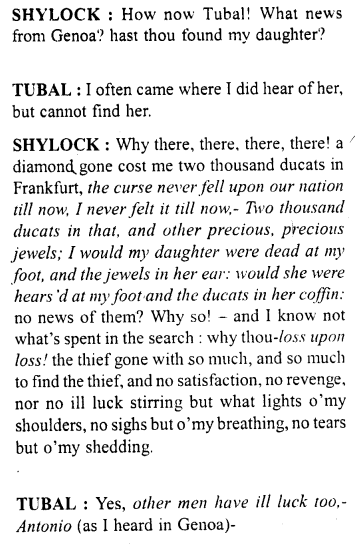
Paraphrase :
SHYLOCK : How now, Tubal! What’s the news from Genoa? Have you found my daughter?
TUBAL : I often came to places where I heard of her, but I cannot find her.
SHYLOCK : Why there, there, there, there! A diamond gone, cost me two thousand dollars in Frankfort! The curse never fell on our nation until now; I never felt it until now. Two thousand dollars in that, and other precious, precious jewels. I wish my daughter were dead at my foot, and the jewels in her ear; I wish she were trained at my feet, and the dollars in her coffin! No news of them? Why, okay: and I don’t know what’s been spent in the search. Why, you— loss on loss! The thief gone with so much, and so much to find the thief; and no satisfaction, no revenge; or only bad luck stirring and sits on my shoulders; no sighs except the ones I’m breathing; no tears except the ones I’m shedding.
TUBAL : Yes, other men have bad luck too. Antonio, as I heard in Genoa
Word Meaning With Annotation
The curse never fell upon our nation till now, I never felt it till now,- Two thousand ducats in that, and other precious, precious jewels : Shylock shows how very self-centred he is. He looks upon his misfortunes as a blow to the whole Jewish nation, though, if we are more charitable, it is possible to assume that he is thinking rather of her daughter Jessica’s falling away from the Jewish faith, and that this is the curse he means. I would my daughter were dead at my foot, and the jewels in her ear: would she were hears’d at my foot and the ducats in her coffin : it would be possible to feel sympathy for Shylock if he declared that he wished his daughter dead, rather than married to a Christian. But he seemingly wished her dead if it would only help him to recover his money and jewels, a particularly despicable wish, hearsed : the hearse is the black funeral carriage which carries the coffin to the grave, loss upon loss : Shylock has lost further sums of money in the search for the runaway lovers, other men have ill luck too,-Antonio : Tubal alternately reminds Shylock of the loss of his daughter-and the bankruptcy of Antonio.
Read the above passage and answer the following questions
Question 1.
What is Shylock’s predicament as reflected in this passage?
Answer:
Shylock is in a sad state because of the loss of his money and his jewels. Of course, he is feeling grieved also on account of the disgrace which his daughter has brought on him by running away from home, and more particularly by running away with a Christian.
Question 2.
In what light do you see Shylock on this occasion?
Answer:
Shylock here appears to be a pathetic figure. Any father would experience similar feelings of grief and degradation at the gross misconduct of this kind on the part of his daughter. Shylock’s grief is natural. But he also appears here in a comic light. The manner in which he laments his loss has a touch of absurdity. In fact, he is more grieved by the loss of his ducats and his jewels than by the loss of his daughter and by a sense of disgrace. He appears as a comic figure also because he is magnifying his personal loss by giving it the dimensions of a national loss. “The curse never fell upon our nation till now”, he says.
Question 3.
Why does Shylock want his daughter dead at his foot and the jewels in her ear?
Answer:
Shylock wants his daughter dead at his foot because his daughter has not only brought him , disgrace and dis honour by running away from home but has also caused him a heavy financial loss by stealing his money and his jewels. He would not mind his daughter’s having the jewels in her ears if he can have the satisfaction of seeing his daughter dead before him. Death would be the only adequate punishment for her misconduct. He would feel tortured if his daughter remains alive and goes about in Genoa, flaunting the jewels which she had stolen from him. If she lies dead before him with the jewels in her ear, he can gloat over the sight. Death is the minimum punishment that the thinks his daughter should receive and he would then not mind the loss of his jewels. Actually these would be the feelings of any father in Shylock’s situation.
Question 4.
What consolation does Tubal offer to Shylock?
Answer:
Tubal tells Shylock that he (Shylock) is not the only man who has suffered bad luck, and that there are other men also in this world who become victims of bad luck. He then mentions the case of Antonio. It is a well-known fact that we feel our own losses much less when we learn that other people have also suffered losses. And our grief over our losses is further diminished if we are told that our enemies have suffered heavy losses. On being told that Antonio has lost his ships on the seas, Shylock feels greatly consoled in his distress.
Question 5.
Does Shylock get any satisfaction or revenge afterwards?
Answer:
Shylock does get some satisfaction afterwards though this satisfaction proves to be short-lived. He comes very close to getting his revenge “upon Antonio when the judge tells him that he is entitled to a pound of Antonio’s flesh. Shylock feels exultant and jubilant at this time, and he had even begun to sharpen his knife. But then the judge tells him that, in the process of cutting the flesh, he must not shed any blood because no blood has been mentioned in the bond. Thus Shylock is unable to get any real satisfaction because he is deprived of the opportunity to take his revenge upon his enemy.
Passage – 5 (Act III, Sc.I, Lines 101-112)
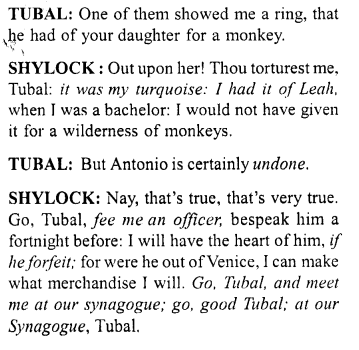
Paraphrase :
TUBAL : One of them showed me a ring that he accepted from your daughter as payment for a monkey.
SHYLOCK : Damn her! You torture me, Tubal: It was my turquoise ring; I got from Leah, my wife, when I was still single; I wouldn’t have traded it for a wilderness of monkeys.
TUBAL : But Antonio is certainly bankrupt.
SHYLOCK : No, that’s true; that’s very true. Go, Tubal, hire me an officer; accuse Antonio as of two weeks ago. I’ll have his heart, if he defaults; because, if he were out of business in Venice, I can make whatever deals I want to. Go, Tubal, and meet meat our synagogue; go, good Tubal; at our synagogue, Tubal.
Word Meaning With Annotation
It was my turquoise : I had it of Leah : Shylock refers to the ring containing a turquoise, a pale blue stone, which he had received from Leah, his dead wife. This is a bitter thought to him, and intensifies his feelings of hatred. Every circumstance in the play now is directed towards irritating and infuriating the Jew. In this manner, his action against Antonio is not unnatural or improbable, undone: ruined; bankrupt, fee me an officer : engaged a law officer by paying him an advance fee. if he forfeit : if he becomes liable for the penalty of the pound of flesh, go, Tubal, and meet me at our synagogue; go, good Tubal; at our synagogue : Shylock arranges to meet Tubal at the Jewish church, his motive being, as we afterwards see, to swear an oath not to give up his scheme of revenge.
Read the above passage and answer the following questions
Question 1.
Who showed Tubal a ring? What did he tell him about this ring? How does it concern Shylock?
Answer:
Some of the creditors of Antonio who came with Tubal to Venice, told him something about Shylock’s daughter. One of them showed him a ring that he got from Jessica in exchange for a monkey. This ring had been stolen by Jessica from her father’s house.
Question 2.
Why is Shylock touched to the quick? Why was this painful and angry reaction on hearing the news about the ring?
Answer:
It is a piece of painful news for Shylock that his daughter not only stole away the ring from his house, but gave it up in exchange for a monkey.
Shylock reacts sharply to the news because the ring had a turquoise studded in it. It was particularly dear to Shylock because it had been given do him by his wife when he was still courting her. He is touched to the quick to hear that his daughter has given up so heartlessly her father’s bridal present from his late, much lamented wife.
Question 3.
Why does Tubal say that Antonio is undone? What makes Tubal say with certainty that Antonio is undone?
Answer:
Tubal tells Shylock that Antonio has been ruined. He says so on the authority of Antonio’s creditors who travelled with him to Venice. They are supposed to posses authentic information about the financial status of the merchant whom they had given loans.
Question 4.
What was Shylock reaction on hearing of Antonio’s misfortunes? Why is he anxious to get Antonio out of Venice?
Answer:
Shylock is happy to hear that Antonio has been ruined. It is a source of great consolation to this man who considers Antonio his enemy. Shylock is anxious to get Antonio out of Venice. In his absence he can do good business in lending money to people charging high rates of interest. So long Antonio is in the city, he will advance loans that are interest-free. This harms Shylock’s money-lending business.
Question 5.
Why, Shylock plans to go to a Synagogue? Give your opinion.
Answer:
Shylock is going to his Synagogue. He asks Tubal to meet him there. His purpose, perhaps, is to present his case before other Jews and win their sympathy and support for his cause.
Question 6.
Explain, “fee me an office ; be speak him a fortnight before.”
Answer:
Shylock instructs Tubal to engage an officer even a fortnight before the expiry of the bond. He should be ready to get Antonio arrested on the forfeiture of the bond. Shylock is certain that Antonio will not be able to repay three thousand ducats loaned to Bassanio against Antonio’s security.
For More Resources